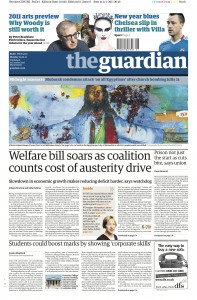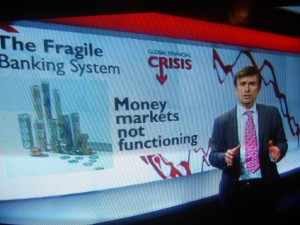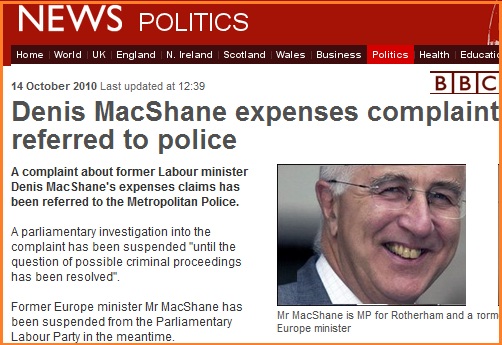In this article in GQ we are delivered of some fascinating facts about the Guardian:
Firstly that Guardian editor Alan Rusbridger admits the BBC is VAST.
Second that the Guardian, losing £1 million a week, is sacrificing its journalism to make cuts…savings…or is it investing for the future?
Third that Labour’s Lord Myners…he of the Libor inquiry, was Chairman of the Guardian Media Group….and a tax avoider big style. (So let me get that right…Murdoch, boss of News International had too much influence on politicians…but the chairman of the Guardian Group is made a Labour minister and it’s OK?)
The BBC: ‘Rusbridger’s poker face falters in irritation when GQ puts this to him, and he rolls his eyes. “Think about the people we’re now up against,” he says. “Murdoch: vast. The Barclay brothers, [owners of the Telegraph Group and the Spectator] immensely rich. The BBC: vast. The Daily Mail, enormous company. And then the Googles and so on.’
 The ‘cuts’: The strong presence of the National Union of Journalists at the Guardian can make this change slow going, which is a real problem for an organisation that desperately wants the flexibility to adapt. By agreement with the union, the forced redundancy of a single member triggers an immediate strike ballot – and the embarrassment a strike would cause the paper would be immense. The only option this leaves is an expensive voluntary redundancy programme, and as the former Observer reporter says, “with voluntary redundancies, you lose people who are in a good position to get jobs elsewhere. You don’t lose the people who you really need to lose.”
The ‘cuts’: The strong presence of the National Union of Journalists at the Guardian can make this change slow going, which is a real problem for an organisation that desperately wants the flexibility to adapt. By agreement with the union, the forced redundancy of a single member triggers an immediate strike ballot – and the embarrassment a strike would cause the paper would be immense. The only option this leaves is an expensive voluntary redundancy programme, and as the former Observer reporter says, “with voluntary redundancies, you lose people who are in a good position to get jobs elsewhere. You don’t lose the people who you really need to lose.”
Two hundred and fifty staff have taken voluntary redundancy since 2009, so some parts of the office are now eerily quiet
The atmosphere among Guardian staff is turbulent. A reporter tells GQ: “There’s a lot of grumbling. People don’t like what the management is doing. They get that we’re losing money hand over fist and we need to stop the losses as much as we can, but they think that what’s being sacrificed is journalism.”
Lord Myners: ‘In 2008, on the eve of the financial crash, GMG – led by then GMG chairman Paul Myners and then CEO Carolyn McCall – took out as much debt as it could at the group’s biggest asset, Trader Media Group, then sold just under half of it to private-equity firm Apax Partners. Then it co-invested about half of the windfall into co-ownership of Emap, a business-to-business publishing and media company, in a deal that valued Emap at more than £1bn.’
Paul Myners, Baron Myners:, CBE (born 1 April 1948) was the Financial Services Secretary (sometimes referred to as City Minister[1]) in HM Treasury, the UK’s finance ministry, during the Labour Government of Gordon Brown.[2] He held the position from October 2008 until May 2010, and was made a life peer in consequence of his appointment, as he was not an elected Member of Parliament. He also served on the Prime Minister’s National Economic Council.
Immediately prior to his ministerial appointment he was Chairman of the Guardian Media Group, publisher of The Guardian and The Observer newspapers,
In March 2009 the Sunday Times revealed that Lord Myners had been chairman of Aspen Insurance Holdings, a Bermuda-based insurance company, for five years, avoiding more than £100 million a year in tax. The Times went on to report that Myners was also chairman of Liberty Ermitage, an offshore fund based in Jersey. Besides this, Gartmore, the fund management company that Lord Myners chaired for 15 years, also ran a Jersey-based offshore business.[15]






